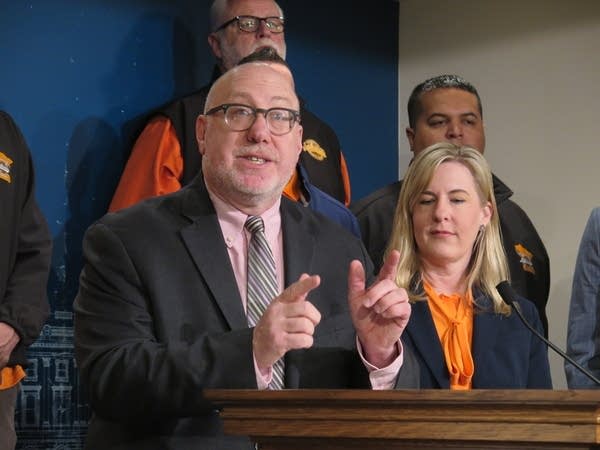Transportation divide widens at Capitol
Go Deeper.
Create an account or log in to save stories.
Like this?
Thanks for liking this story! We have added it to a list of your favorite stories.

Updated 2 p.m. | Posted 10 a.m.
The partisan divide over transportation funding widened Tuesday at the Minnesota Capitol. First, House Democrats joined Gov. Tim Walz in calling for a 20 cent per gallon gas tax increase. Then Senate Republicans, who strongly oppose the tax increase, held a hearing to blast the Walz plan and rejected it on a largely party-line vote.
House DFL leaders released a transportation budget that they say would make “honest investments” in roads, bridges and transit. House Speaker Melissa Hortman, DFL-Brooklyn Park, said it’s time to for action to fix the state’s crumbling transportation infrastructure.
Turn Up Your Support
MPR News helps you turn down the noise and build shared understanding. Turn up your support for this public resource and keep trusted journalism accessible to all.
“Minnesotans expect our transportation system to be safe, modern and efficient. But over the years, underfunding has left roads and bridges in terrible condition and transit is underdeveloped.”
The House plan would increase the per-gallon tax by 5 cents a year over four years. Walz would phase in the increase over two years. There would also be future inflationary increases.
House transportation committee chair Rep. Frank Hornstein, DFL- Minneapolis, said, like the governor’s, the House plan also reverses the decision made two years ago to dedicate sales tax revenue to roads and bridges.
“The bill that we are unveiling today establishes permanent, sustainable, ongoing and dedicated funding for transportation that meets the needs of our growing state. And let’s be clear, the gas tax is dedicated to roads and bridges in our constitution.”
Senate Republicans firmly oppose the gas tax proposal. They also disagree with the Democrats' proposed increases in license tab fees and motor vehicle sales taxes.
They made their position clear in a transportation committee hearing in the Republican-controlled Senate.
Sen. John Jasinki, R-Faribault, said the governor's plan is too expensive. "I want money for roads and bridges," he said, "but I think we really have to look at how it hits our families."
Sen. Jason Rarick, R-Pine City, objected to the ending the flow of sales tax money to transportation that was enacted in 2017. Rarick said the owners of electric cars and hybrids are not contributing enough through the gas tax.
“If we use the sales taxes and the lease taxes and the auto parts taxes, they’re contributing just as much as the gas vehicles are.”
The committee chair, Sen. Scott Newman, R-Hutchinson, said the Walz plan would have a negative economic impact on the state. Newman said he too believes the gas tax is an outdated way to pay for roads and bridges.
“I honestly think that we have to as a society realize that we have to fully fund transportation. But it can’t be funded just with user fees.”
Newman’s committee voted
9-6
10-5 with one abstention to reject the governor’s transportation funding proposals. (A clerical error originally led to the vote being announced as 9-6)
Sen. Nick Frentz, DFL-North Mankato, reminded his colleagues that Walz made no secret of his support for a gas tax increase.
“The governor campaigned on this. I was impressed, even if he wasn’t from Mankato, that he came forward and said ‘we need new revenue for roads.’ He put it out for the voters, and I think the voters gave him a mandate. I would like to think part of the is his support of the gas tax. If the voters send us that message, we ought to listen.”
Walz suggested the committee vote was all for show and said he was disappointed that Senate Republicans used only part of his transportation plan to make it appear worse than it is.
“If it’s for theater, which of course it is, I would encourage them, why don’t you take the whole bill up?” Walz asked. “Why don’t you look at it in its entirety? Why are you pulling out the revenue pieces without what you get out of it and the return on the investment?”


